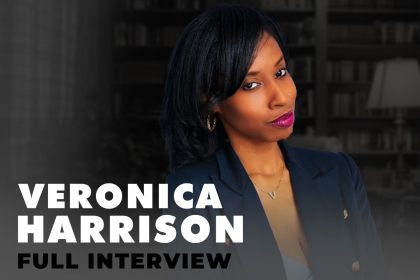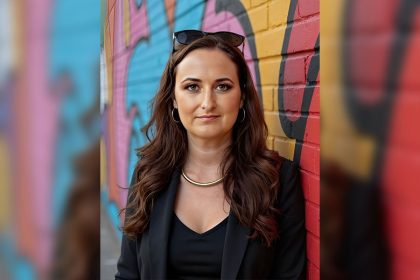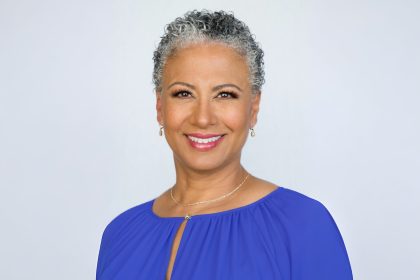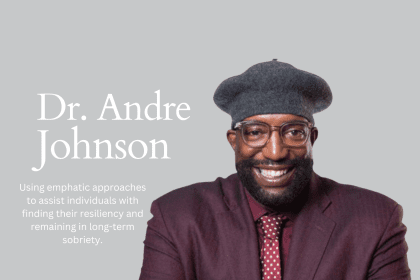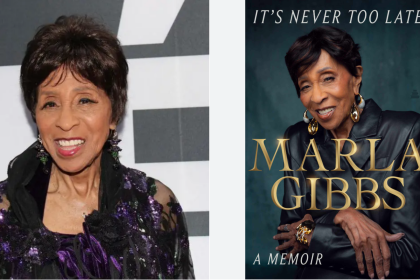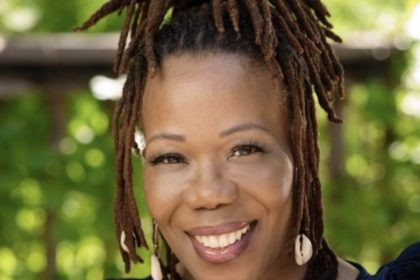
Monique Rodriguez, founder and CEO of Mielle Organics, has transformed the beauty industry with her faith-driven approach to entrepreneurship and product development. After experiencing the devastating loss of her infant son in 2014, Rodriguez channeled her grief into creating one of the fastest-growing textured haircare brands in the world.
What began as a way to transform pain into purpose has evolved into a global enterprise found in more than 100,000 stores worldwide, culminating in a historic partnership with Procter & Gamble in 2023—the largest deal ever secured by a Black female beauty founder.
In her new book, The Glory in Your Story: Activating a Fearless Faith to Change Your Life, Your Career, and the World, Rodriguez offers readers an intimate look at her journey from the Southside of Chicago to beauty industry powerhouse.
Drawing from her experiences as a registered nurse, devoted Christian, wife, and mother of two, she reveals how personal tragedy became a catalyst for extraordinary achievement through unwavering faith and determination. Rodriguez’s story of overcoming near bankruptcy, questionable business partners, and moments of self-doubt serves as an inspiration for aspiring entrepreneurs seeking to transform their own adversity into opportunity.
Tell us about the title of your new book
I came up with the title. It was a collaborative effort with my team, my husband and I. So, from the very beginning, when we launched our brand, my husband had this saying, the story must be told, and so it’s painted in our office. It’s been our theme all throughout us building Mielle.
And we say that because when we say the story must be told, we understand where God brought us, from what we went through to accomplish the success that we have been able to garner. And it’s given all God the glory. And so when we say the story must be told. It’s not really our story, but it’s His story.
I feel that when people look at Mielle or look at myself and what I’ve been able to accomplish and build. They see the highlight reel, they see the glory, but they don’t know the story behind the success. And so I just want to help people identify that there’s always glory within their story.
They just have to dig within themselves deeply to figure out what is their glory in their story. No matter what pains, trials, and tribulations that they’ve gone through, there’s always purpose behind that pain, and there’s glory, and it’s ultimately God’s glory.
Why did you become a nurse before entering entrepreneurship?
I became a nurse because it was really something that was kind of forced. My mom highly encouraged me to go into the medical field. I think I’ve always been a nurturer by nature, though, just growing up. I’ve always been the responsible teenager that babysitted all the kids.
So, I think that nurturing came naturally to me. So going in the field of nursing was something that was a very organic type of flow, but it was really encouraged from her, because that’s what I was exposed to growing up.
My mother worked at a hospital, and she would always have me exposed to her nursing friends. And so that was the life that I knew, and that was the only route that I saw as successful to make it out of my mom’s house, or to make it out of the hood,, was to have a stable background and a stable career, and it was very traditional in my household.
Go to school, go to college and work as a registered nurse, and you will find success that way. That was kind of like the traditional route of what was instilled in me from a very young age. So, at a young age, there was no other route to go outside of the nursing and medical field.
How did your nursing background prepare you for entrepreneurship?
I tell people, never take for granted any path or skill set that you have learned on your journey, because you never know if God is using that skill set to prepare you for something that’s in your future, that you may not be able to see or envision yet. So never take any skill set for granted.
I tell my kids to always learn. I believe in diversity. I believe in having them try multiple things because I feel like it homes in on their skill set. It builds character.
And working as a nurse, that’s exactly what it did for me. It built a different layer of character that I didn’t think that I had, because, working as a nurse, it allowed me to work with all types of different walks of life. I know how to conduct myself in any type of room, because I’ve been used to working with people who were considered maybe lower class all the way to people that were considered a higher class.
I have been working with those types of people like for the course of the eight years that I was working as a nurse, and it also taught me how to build relationships with people, because when you work as a nurse and you go into a patient’s room, and you’re getting ready to stick this IV needle and draw blood, or you’re getting ready to give this medication, and the patient doesn’t know what you’re giving them. They have to have some type of trust, and you as a nurse, you have to build up rapport with your patients.
I feel like business, one on one building relationships and building rapport with your customers, with people that you do business with. And I always say that people do business with who they know, like and trust, and in order for people to know, like and trust you, there has to be some type of relationship building.
Working as a nurse helped me hone in on those relationship building skills. And then the science background, when I began to formulate, and I worked with the chemist to understand what formulations work, to understand how I wanted the products to perform, to understand how I wanted the ingredients to perform, and what ingredients I actually wanted to put in the products. I had to have some type of knowledge of chemistry, and that came from my nursing background.
Those were the top three things that I learned as a nurse that developed this skill set in me that I applied and took over into the business world, and vice versa with my husband as well, too, he came from logistics, and of course, when he started in logistics, he didn’t know that his logistical background would play a huge part, a major part in building our logistical and operations infrastructure on the back end. So again, never take any of your experiences for granted, because it will eventually pay off later.
How important is discernment in business leadership?
The power of discernment is something that I honestly pray for every single day. I pray for wisdom and discernment, because you have to have good observation and assessment skills. And that’s also something that I learned as a nurse, because in my very first course as a nurse, we had to learn how to assess, not only assess people, but assess situations.
And when you talk about reading the room you have to know how to go into a room, how to command the attention in the room, but not command it in a way where you’re overshadowing everyone else in the room like your presence is always known, and when you speak up and you have something to say, like people pay attention to you, because they know that when you have something to say, it’s very important, and so I am able to walk into a room. I don’t feel like I have to be the loudest person in the room. I walk into a room to learn.
And I think that the biggest skill set as an entrepreneur is that you have to be open. You have to be humble, and you have to be willing to learn, and when you are going in there with the spirit of humility, and you’re going in with the spirit of I want to increase my knowledge. And I want to learn from the people in the room, that allows you to take a step back, to assess the situation, and to discern all of the other spirits or energies that are in the room.
But if you go into a room, and you want to be the loudest person in the room, and you want to call the shots. Then you’re taken away from that ability to really assess and observe what’s really going on in the room. And I think that’s one of the greatest qualities that I’ve garnered as a CEO is having that humility to be able to learn, and I feel like it has contributed to my success a lot, and I depend on God for my discernment.
Because I have a relationship with God, I feel that He gives me that, and when He gives me that discernment, I also pray for the wisdom to manage the situations that He has put me in.
How did your conversations with God help you through the loss of your child?
One of the biggest conversations that I had with God was: what are you trying to teach me from this conversation? When everything initially happened, why did this happen to me? Why me? I did everything I was supposed to do. I didn’t do drugs, I didn’t do anything to harm myself for me to have this traumatic uterine rupture in my pregnancy.
But I also felt that God whispered to me in a still, small voice, and He said, “If you trust Me, I’m going to show you the way. I’m going to lead you and guide you to a place that you didn’t even imagine a place of promise. But you have to trust Me that I’m going to order your steps, and there will be joy in the morning.”
I had to hold on to that Scripture that joy will come in the morning, and that all things will work together for the good. I know He doesn’t say all good things. He doesn’t say all bad things. He says all things will work together for the good, and He also tells us, in addition to that is, that He will be near those who mourn.
He will comfort those that mourn, and standing on Scripture to help me get through that was very key for me, because there was no one that was living and breathing on this earth that could help me get through the pain that I was going through other than God, other than going to church and leaning on my faith was something that carried me through.
It was just having those conversations, and sometimes you don’t even have the words to say. Sometimes it’s just getting on your knees and crying and just surrendering, and God will speak to you in those still small moments, and He told me that He will get me through. I will be okay, but I have to trust Him.
Why is surrender such an important concept for entrepreneurs?
Because I’ve learned that when you surrender and when you let go, you truly step aside and you let God do His work, and I feel like that’s all God is waiting for. He’s waiting for us to just get out of the way. Step aside so He can really show up and show His strength and show His power.
And I think, as humans, we have a tendency to want to try to assist God, or to put our hands in the pot, and He’s like, “No, I got this. I don’t need your help. I created you,” and I’ve learned that there have been a lot of situations, and I share this a lot in the book where I have prayed on it and said, “I’m going to let it go.”
I put it in God’s hand, and I’m going to let it go, and I have seen God’s hand show up several different times in several different ways, and then I look back in hindsight, and I’m like I couldn’t have done that on my own. That was nothing but God.
But I had to just let it go and surrender. So I’ve witnessed it personally that He will show His power. But we gotta get out of the equation because He doesn’t need any of our assistance.
How should entrepreneurs approach your book?
I think honestly, all the chapters are important for any entrepreneur, because it shows the highs, the lows. It shows how I even got to the stage of being an entrepreneur, and I think, before anyone is an entrepreneur you go through the stages of, is this for me? Do I step out on faith? What happens if I don’t have enough money? What happens if people don’t buy from me? People don’t support me? You go through a lot of self sabotage.
And at some point, before you’re an entrepreneur. You were something else, and you’re trying to transition from that something else to get to the stage of entrepreneurship. And the book talks about my childhood. The mindset that I had, even from a very young girl, and how that mindset shifted over the years, and how mindset is also very important in order to become an entrepreneur. Success is really a mindset shift.
But it also shows something else, what I was doing before, and how I actually made the transition and made the leap of faith. And then once you make the leap of faith, then it shows the trajectory. I think that it tackles all aspects of someone that’s even thinking about entrepreneurship, someone that’s in entrepreneurship. It speaks to both audiences because I think that every entrepreneur that’s building a brand, because I know I felt it.
You always feel like you’re the only one that’s going through the situations that you’re going through when you’re going through it, and I think it gives hope for the entrepreneur to say, wow! She went through the same thing I’m experiencing right now, and this is how you navigate those situations. I think it speaks to both.
What did you learn about yourself through writing this book?
What I would share is that I have reached a new pinnacle of vulnerability, to put myself out there, to put a lot of my business out there with the hopes of helping people. But in order to help people, you have to use relatable like tangible examples.
And I feel like with me just putting my story out there and saying: You know what, I’m going to put it out there. I’m not going to care what anyone thinks. I’m going to pour my heart and soul into this book, and I just feel like I’ve reached a new level of vulnerability that I didn’t have while I was in the building phases. But I do feel that vulnerability is the path to victory. So someone will get the victory from my story. So that’s what I feel that has reached a new pinnacle since writing this book.
The Power of Monique’s Story
Monique Rodriguez’s story is a testament to the power of unwavering faith, resilience, and purpose. Through The Glory in Your Story, she offers entrepreneurs and dreamers a heartfelt reminder that even the deepest pain can become the foundation for incredible success. Her journey continues to inspire a new generation to trust their path, embrace their story, and believe in the beauty that can rise from life’s greatest challenges.



